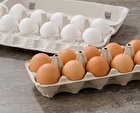RBA Governor Warns Australians to Brace for Higher Inflation, Lower Growth

After nearly three decades of low and stable inflation that generally remained within the Reserve Bank's target range of 2-3 percent, central bankers were caught off-guard by the prices surge during the past year-and-a-half, the ABC reported.
"An inflation rate of 7 or 8 percent was something that was widely thought to be consigned to the history books," RBA governor Philip Lowe said at the Committee for Economic Development of Australia's annual dinner.
"So the current bout of high inflation has come as quite a shock."
Mr Lowe again warned that it was important for inflation to be tamed quickly, before expectations of higher prices set in, otherwise it would be much harder and more economically damaging to do so, as was the case in the 1980s and early '90s.
"Bringing inflation back down required high interest rates and was associated with a deep recession and a rise in the unemployment rate of at least 5 percentage points," he observed.
"The high unemployment then persisted for years and left deep scars in the labour market and damaged our communities. It was very costly."
So far, Mr Lowe remains comfortable that inflation expectations remain moderate, with wage growth still lagging well behind increases in consumer prices and "consistent with the target" of 2-3 per cent inflation.
However, Mr Lowe is less sanguine about global economic and geopolitical developments, which he warned will make inflation less predictable and harder to keep low than it has been over the past 30 years.
"Developments on the supply side were either mostly benign or favourable for managing inflation," he said of the period between the 1990s and the COVID pandemic.
"In addition, rapid economic growth in China lowered the relative prices of manufactured goods and demographic trends around the world led to an increase in the supply of labour engaged in the global economy.
"Importantly, we also largely avoided the major wars that have been sources of inflation in the past."
Mr Lowe said these global developments made the job of central bankers a lot easier, but many of them are now reversing, with added complications to the cheap supply of goods and services.
"International trade is no longer growing faster than the global economy. Trading blocs are emerging and there is a step back from closer integration," he warned.
"Unfortunately, today barriers to trade and investment are more likely to be increased than removed.
Mr Lowe noted three other factors that are disrupting supply and thus putting upwards pressure on prices.
The first is a fall in the working age population of most developed economies and several major emerging economies, notably China.
"Over the past 20 years, the number of major floods has doubled and the frequency of extreme heatwaves and droughts has also increased significantly," Mr. Lowe observed.
"These climate events disrupt production and they affect prices."
Finally, the transition to renewable energy to address this climate crisis will itself likely bring short-term increases in energy costs.
Without using the term, Lowe raised the spectre of "stagflation", an economic state where inflation is high despite the economy being weak.
"Life is more complicated in a world of supply shocks; an adverse supply shock increases inflation and reduces output and employment," he warned.
"Higher inflation calls for higher interest rates but lower output, and fewer jobs call for lower interest rates. It is likely that we will have to deal with this tension more frequently in the future."
Given this, Lowe issued a not-too-subtle plea for the federal government to continue the budget repair job it tentatively embarked upon last month.
"In a world of more frequent supply shocks, we will be better off if there is flexibility in our labour and product markets so that we can respond quickly and effectively," he told an audience containing many business leaders.
"This includes flexibility in terms of fiscal policy, which requires maintaining a strong underlying structural budget position."
4155/v























